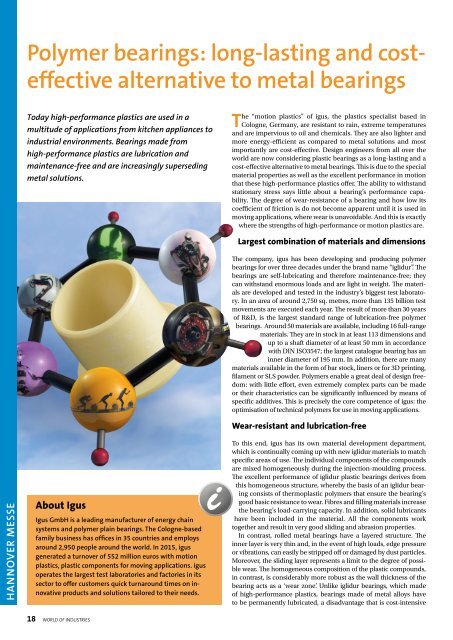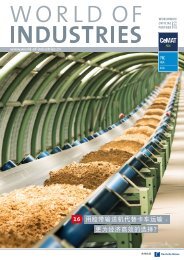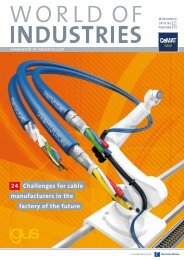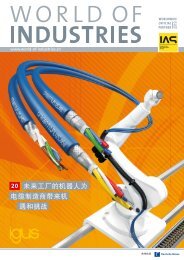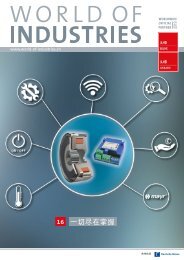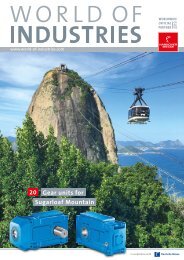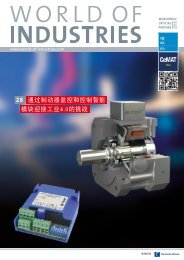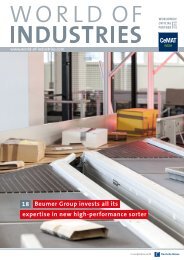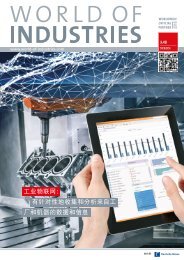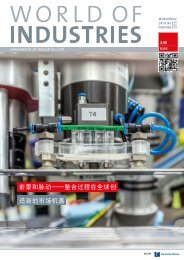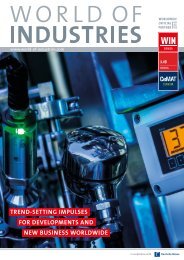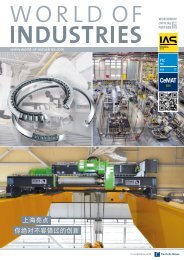world of industries 3/2017 (EN)
world of industries 3/2017 (EN)
world of industries 3/2017 (EN)
- TAGS
- world
- industries
Create successful ePaper yourself
Turn your PDF publications into a flip-book with our unique Google optimized e-Paper software.
Polymer bearings: long-lasting and costeffective<br />
alternative to metal bearings<br />
Today high-performance plastics are used in a<br />
multitude <strong>of</strong> applications from kitchen appliances to<br />
industrial environments. Bearings made from<br />
high-performance plastics are lubrication and<br />
maintenance-free and are increasingly superseding<br />
metal solutions.<br />
The “motion plastics” <strong>of</strong> igus, the plastics specialist based in<br />
Cologne, Germany, are resistant to rain, extreme temperatures<br />
and are impervious to oil and chemicals. They are also lighter and<br />
more energy-efficient as compared to metal solutions and most<br />
importantly are cost-effective. Design engineers from all over the<br />
<strong>world</strong> are now considering plastic bearings as a long-lasting and a<br />
cost-effective alternative to metal bearings. This is due to the special<br />
material properties as well as the excellent performance in motion<br />
that these high-performance plastics <strong>of</strong>fer. The ability to withstand<br />
stationary stress says little about a bearing’s performance capability.<br />
The degree <strong>of</strong> wear-resistance <strong>of</strong> a bearing and how low its<br />
coefficient <strong>of</strong> friction is do not become apparent until it is used in<br />
moving applications, where wear is unavoidable. And this is exactly<br />
where the strengths <strong>of</strong> high-performance or motion plastics are.<br />
Largest combination <strong>of</strong> materials and dimensions<br />
The company, igus has been developing and producing polymer<br />
bearings for over three decades under the brand name “iglidur”. The<br />
bearings are self-lubricating and therefore maintenance-free; they<br />
can withstand enormous loads and are light in weight. The materials<br />
are developed and tested in the industry’s biggest test laboratory.<br />
In an area <strong>of</strong> around 2,750 sq. metres, more than 135 billion test<br />
movements are executed each year. The result <strong>of</strong> more than 30 years<br />
<strong>of</strong> R&D, is the largest standard range <strong>of</strong> lubrication-free polymer<br />
bearings. Around 50 materials are available, including 16 full-range<br />
materials. They are in stock in at least 113 dimensions and<br />
up to a shaft diameter <strong>of</strong> at least 50 mm in accordance<br />
with DIN ISO3547; the largest catalogue bearing has an<br />
inner diameter <strong>of</strong> 195 mm. In addition, there are many<br />
materials available in the form <strong>of</strong> bar stock, liners or for 3D printing,<br />
filament or SLS powder. Polymers enable a great deal <strong>of</strong> design freedom:<br />
with little effort, even extremely complex parts can be made<br />
or their characteristics can be significantly influenced by means <strong>of</strong><br />
specific additives. This is precisely the core competence <strong>of</strong> igus: the<br />
optimisation <strong>of</strong> technical polymers for use in moving applications.<br />
Wear-resistant and lubrication-free<br />
HANNOVER MESSE<br />
About Igus<br />
Igus GmbH is a leading manufacturer <strong>of</strong> energy chain<br />
systems and polymer plain bearings. The Cologne-based<br />
family business has <strong>of</strong>fices in 35 countries and employs<br />
around 2,950 people around the <strong>world</strong>. In 2015, igus<br />
generated a turnover <strong>of</strong> 552 million euros with motion<br />
plastics, plastic components for moving applications. igus<br />
operates the largest test laboratories and factories in its<br />
sector to <strong>of</strong>fer customers quick turnaround times on innovative<br />
products and solutions tailored to their needs.<br />
To this end, igus has its own material development department,<br />
which is continually coming up with new iglidur materials to match<br />
specific areas <strong>of</strong> use. The individual components <strong>of</strong> the compounds<br />
are mixed homogeneously during the injection-moulding process.<br />
The excellent performance <strong>of</strong> iglidur plastic bearings derives from<br />
this homogeneous structure, whereby the basis <strong>of</strong> an iglidur bearing<br />
consists <strong>of</strong> thermoplastic polymers that ensure the bearing’s<br />
good basic resistance to wear. Fibres and filling materials increase<br />
the bearing’s load-carrying capacity. In addition, solid lubricants<br />
have been included in the material. All the components work<br />
together and result in very good sliding and abrasion properties.<br />
In contrast, rolled metal bearings have a layered structure. The<br />
inner layer is very thin and, in the event <strong>of</strong> high loads, edge pressure<br />
or vibrations, can easily be stripped <strong>of</strong>f or damaged by dust particles.<br />
Moreover, the sliding layer represents a limit to the degree <strong>of</strong> possible<br />
wear. The homogeneous composition <strong>of</strong> the plastic compounds,<br />
in contrast, is considerably more robust as the wall thickness <strong>of</strong> the<br />
bearing acts as a ‘wear zone’. Unlike iglidur bearings, which made<br />
<strong>of</strong> high-performance plastics, bearings made <strong>of</strong> metal alloys have<br />
to be permanently lubricated, a disadvantage that is cost-intensive<br />
18 WORLD OF INDUSTRIES


